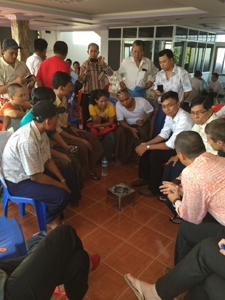 Emerging from five decades of economic and political isolation, Myanmar is at an exciting point in its history. The country’s leaders have begun to implement a series of democratic and economic reforms in pursuit of an ambitious goal: to leverage rich natural resources and the talents of a young, eager workforce to become the next ‘Asian tiger.’ But – the country is currently one of the poorest in Asia and faces many challenges, including limited infrastructure, ethnic tensions, and uncertainty about the extent to which the current government will transfer absolute power to a democratically elected civilian government (elections will be held in 2015).
Emerging from five decades of economic and political isolation, Myanmar is at an exciting point in its history. The country’s leaders have begun to implement a series of democratic and economic reforms in pursuit of an ambitious goal: to leverage rich natural resources and the talents of a young, eager workforce to become the next ‘Asian tiger.’ But – the country is currently one of the poorest in Asia and faces many challenges, including limited infrastructure, ethnic tensions, and uncertainty about the extent to which the current government will transfer absolute power to a democratically elected civilian government (elections will be held in 2015).
Reading about a situation is far different from experiencing it firsthand – so when the opportunity arose to travel to Myanmar with the Aspen Institute Global Alliances Program and the Richardson Center’s Partnership Opportunity Delegation, I was intrigued. Having worked on the issue of lack of reliable access to water in over a dozen countries over the last decade, I’m aware of how important it is to provide water security to communities in transition. And as a social entrepreneur, I’m a firm believer in the potential for businesses to fill in the gaps left by government and the social sector. Nearly 40 million people in Myanmar live with limited access to clean water sources; the problem is especially acute during the hot, dry pre-monsoon months and has been exacerbated in the wake of Thyphoon Nargis.
Over the course of a week, our group interacted with a diverse group of Myanmar people – from school children and former political prisoners, entrepreneurs and government officials. It was a week of stark juxtapositions: we heard about the government’s ambitious plans to construct free trade zones and visited the new capital of Naypidaw – a testament to the government’s ability to successfully complete large infrastructure projects. We visited one of the best schools in the country, where access to basic textbooks is limited and spent time with a telecom company that buzzed with all the energy of a Silicon Valley startup. We met with Aung San Suu Kyi at her home in Yangon and listened as land rights activists in Mandelay told us of their struggles.In addition, our POD group proved to be a rich resource; participants included professionals who lived and worked in the country, investors, philanthropists, entrepreneurs and policymakers.
Everyone brought a unique perspective and motivation for joining the delegation and our diverse interests led to conversations that lasted long into the evening (and have continued even weeks the trip), and served to accelerate and deepen our entire group’s understanding of the challenges and opportunities present in Myanmar.

